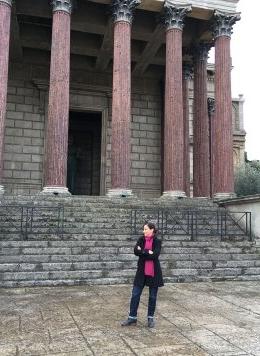Classical Studies Track
The Classical Studies track is designed for students seeking a comprehensive background in the ancient cultures of the Mediterranean region as they prepare for careers in law, medicine, business, or other fields in which writing and strong critical thinking skills are essential.
To complete the Classical Studies major, students are required to complete satisfactorily ten courses plus the senior seminar in Classics (CLAS 190 PZ/SC/PO, to be taken in the fall of the senior year), unless an alternative is agreed upon with the student's adviser.
The ten courses must include:
- At least three courses in Greek or Latin; at least one course must be intermediate level or above (103 and 104 are half courses).
- Ideally students will take CLAS 001 PO (Greek and Roman Classics) early in their studies.
- The remaining courses will be chosen in consultation with the major adviser, and may be drawn from offerings in literature, archaeology, history, philosophy, culture.
- A senior thesis (CLAS 191) may count as one of these courses.
Classical Languages and Literature Track
To complete the option in Classical Languages, students are required to complete satisfactorily a total of ten courses in Greek and Latin (Classical Hebrew may be substituted for one of them) plus the senior seminar in Classics (CLAS 190 PZ/SC/PO ). Students must complete at least four courses in one of the two languages chosen (at least one of those courses must be numbered 100 or above; 103 and 104 are half courses) and at least three courses in the other language (one of these courses must be numbered 100 or above), but students are encouraged to take additional courses in each language. Additional courses in archaeology, literature, history, and culture shall be chosen in consultation with the student's adviser; a senior thesis may count as one of these courses. The senior seminar (CLAS 190 PZ/SC/PO, to be taken in the fall of the senior year), unless an alternative is agreed upon with the student's adviser.
For students intending to pursue graduate study in Classics or Classical Archaeology, a command of both Greek and Latin is essential (with proficiency through the Advanced level in at least one language); acquiring reading competency in French, German, and/or Italian is strongly recommended. Interested students should meet with their advisers early in their academic careers to plan for graduate school.




